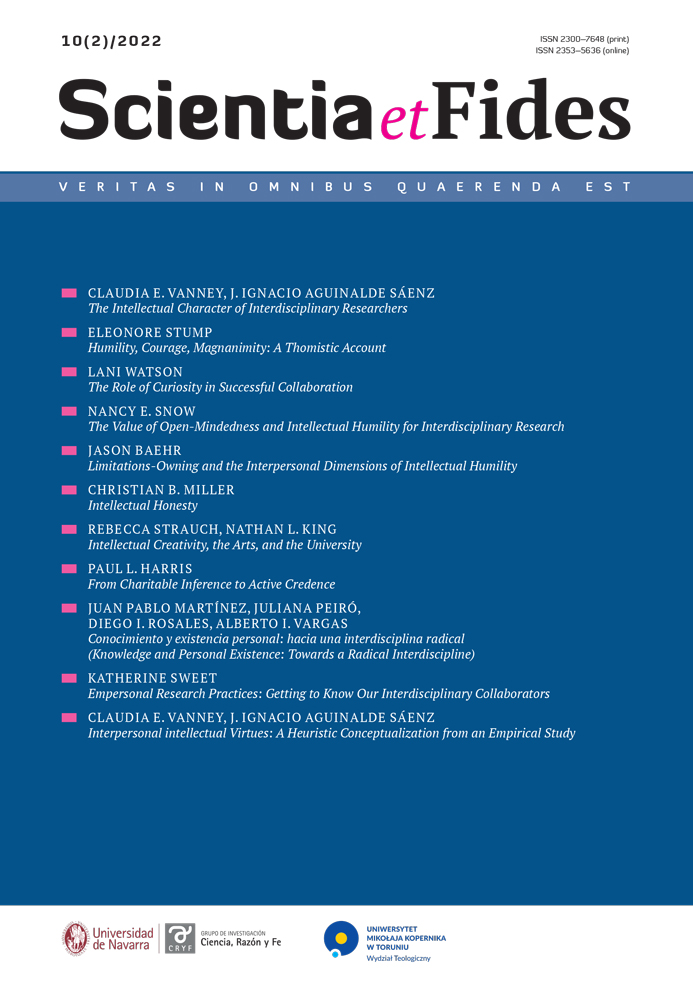The Intellectual Character of Interdisciplinary Researchers
DOI:
https://doi.org/10.12775/SetF.2022.015Keywords
intellectual virtues, intellectual character, virtue epistemology, interdisciplinary research, fundamental questionsAbstract
The study and understanding of fundamental questions cannot be addressed by a single discipline. A plurality of insights needs to be integrated or coordinated to allow for mutual enrichment in interdisciplinary research. The intellectual character describes the set of dispositions that both configure and motivate intellectual behavior. In this paper, we explore the intellectual virtues that constitute the ideal character of an interdisciplinary researcher. We look at dimensions of several intellectual virtues – intellectual curiosity, open-mindedness, intellectual humility, and intellectual honest – relevant to interdisciplinarity, we discuss the significance of other character traits – intellectual creativity and intellectual trust – for integrating a plurality of insights, and we argue for the need of a social cognition approach, emphasizing the relevance of interpersonal intellectual virtues in interdisciplinary inquiry. All these virtues are key constituents of the intellectual character of interdisciplinary researchers.
References
Aikin, Scott F., and J. Caleb Clanton. 2010. “Developing Group-Deliberative Virtues.” Journal of Applied Philosophy 27 (4): 409–424. doi: 10.1111/j.1468-5930.2010.00494.x.
Alfano, Mark, Colin Klein, and Jeroen Ridder, eds. 2022. Social Virtue Epistemology: Taylor & Francis Group.
Baehr, Jason. 2018. “Intellectual Creativity.” In, edited by Berys Gaut and Matthew Kieran, 42–59. Oxon: Routledge.
Ballantyne, Nathan. 2019a. “Epistemic Trespassing.” Mind 128 (510): 367–395. doi: 10.1093/mind/fzx042.
Ballantyne, Nathan. 2019b. Knowing our Limits. New York: Oxford University Press.
Fairweather, Abrol. 2014. Virtue epistemology naturalized: Bridges between virtue epistemology and philosophy of science, Synthese library; 366. Cham: Springer.
Goodman, Nelson. 1978. Ways of Worldmaking. Indianapolis: Hackett Pub. Co.
Hookway, Christopher. 2003. “How to Be a Virtue Epistemologist.” In Intellectual Virtue: Perspectives from Ethics and Epistemology, edited by Michael R. DePaul and Linda Trinkaus Zagzebski. Oxford: Clarendon.
Paternotte, Cedric, and Milena Ivanova. 2016. “Virtues and Vices in Scientific Practice.” Synthese 194 (5): 1787–1807. doi: 10.1007/s11229-016-1023-2.
Ritchhart, Ron. 2002. Intellectual Character. What It Is, Why It Matters, and How to Get It, The Jossey-Bass Education Series. San Francisco: Jossey-Bass.
Roberts, R., and W. Wood. 2007. “Epistemology.” In Intellectual Virtues. An Essay in Regulative Epistemology, edited by R. Roberts and W. Wood, 3–31. Oxford: Clarendon Press.
Ross, Lewis. 2018. “The Virtue of Curiosity.” Episteme 17 (1): 105–120. doi: 10.1017/epi.2018.31.
Schmitt, Frederick F., and Reza Lahroodi. 2008. “The Epistemic Value of Curiosity.” Educational Theory 58 (2): 125–148. doi: 10.1111/j.1741-5446.2008.00281.x.
Stump, David J. 2007. “Pierre Duhem’s Virtue Epistemology.” Studies in History and Philosophy of Science. Part A 38 (1): 149–159. doi: 10.1016/j.shpsa.2006.12.010.
Vallor, Shannon. 2014. “Experimental Virtue: Perceptual Responsiveness and the Praxis of Scientific Observation.” In Virtue epistemology naturalized: Bridges between virtue epistemology and philosophy of science, edited by Abrol Fairweather, 269–290. Cham: Springer.
Vanney, Claudia E., and Ignacio Aguinalde. 2021. “Second-person Perspective in Interdisciplinary Research: A Cognitive Approach for Understanding and Improving the Dynamics of Collaborative Research Teams.” Scientia et Fides 9 (2): 155–178. doi: https://doi.org/10.12775/SetF.2021.023.
Downloads
Published
How to Cite
Issue
Section
License
Copyright (c) 2022 Claudia E. Vanney, J. Ignacio Aguinalde Sá enz

This work is licensed under a Creative Commons Attribution-NoDerivatives 4.0 International License.
CC BY ND 4.0. The Creator/Contributor is the Licensor, who grants the Licensee a non-exclusive license to use the Work on the fields indicated in the License Agreement.
- The Licensor grants the Licensee a non-exclusive license to use the Work/related rights item specified in § 1 within the following fields: a) recording of Work/related rights item; b) reproduction (multiplication) of Work/related rights item in print and digital technology (e-book, audiobook); c) placing the copies of the multiplied Work/related rights item on the market; d) entering the Work/related rights item to computer memory; e) distribution of the work in electronic version in the open access form on the basis of Creative Commons license (CC BY-ND 3.0) via the digital platform of the Nicolaus Copernicus University Press and file repository of the Nicolaus Copernicus University.
- Usage of the recorded Work by the Licensee within the above fields is not restricted by time, numbers or territory.
- The Licensor grants the license for the Work/related rights item to the Licensee free of charge and for an unspecified period of time.
FULL TEXT License Agreement
Stats
Number of views and downloads: 916
Number of citations: 0



